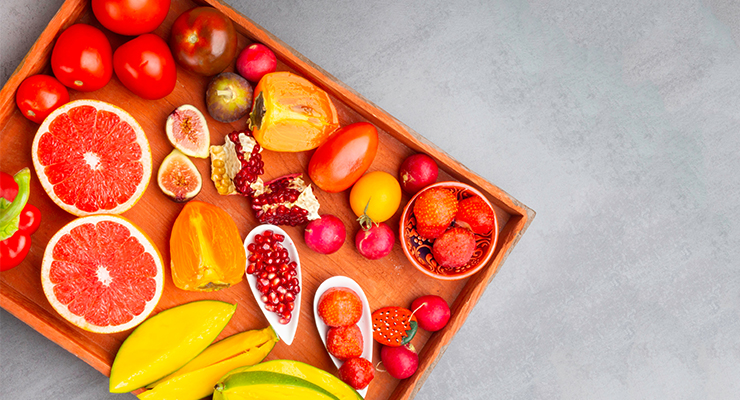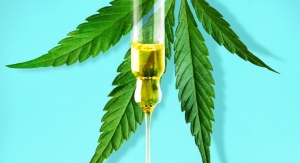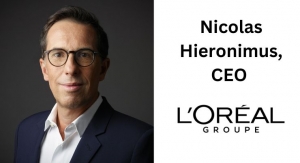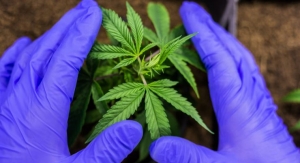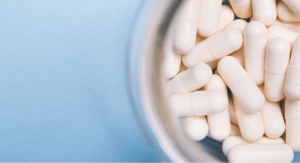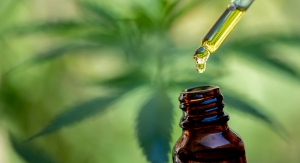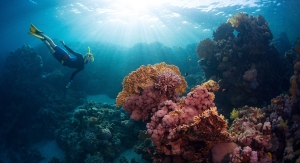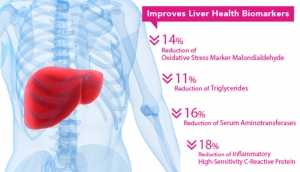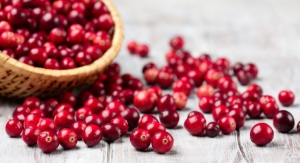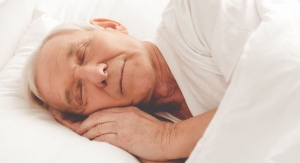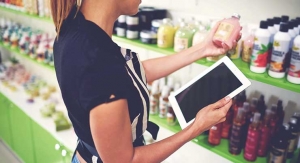09.01.20
Mix of Carotenoids May Offer Protective Effects for Skin
While it might not be characterized as an ingestible form of sunscreen, a cocktail of carotenoids showed significant protective effects against skin pigmentation changes from long-wave (UVA) and short-wave (UVB) forms of radiation, in a 12-week, randomized, double-blind, placebo-controlled study.
The study, which was conducted at the Leibniz Research Institute for Environmental Medicine in Germany, in collaboration with Amway Corporation and published in the journal of Photodermatology, Photoimmunology, and Photomedicine, evaluated the effects of taking a supplement containing B-carotene, a-carotene, lutein, and zeaxanthin at a standardized dose three times daily.
After 12 weeks of supplementation, the minimal persistent pigmentation dose (MPPD) of each volunteer was assessed by visual grading 20-24 hours after irradiation with a Dermalight test. An increased MPPD reading indicates increased protection against UVA-induced skin pigmentation.
It was found that a daily oral intake of the carotenoid complex increased UVA-induced MPPD values significantly compared to the placebo, which evidences that carotenoids can protect the human skin against UVA-induced pigmentation and UVA radiation. This is the first clinical evidence that oral intake of such carotenoids can protect human skin against the sun’s harmful rays, researchers claimed.
The carotenoids’ protective effect against UVB radiation was measured by evaluating participants’ minimal erythema dose (MED), which is the minimal amount of energy required to induce visible redness of the skin. MED is defined as a uniform, clearly demarcated redness at 16-24 hours after UV exposure. Significant differences were observed between the placebo and intervention group at 4, 8, and 12 weeks. In the intervention group a significant increase was observed in the amount of UVB required to induce erythema.
Researchers who conducted the study also found that supplementation was associated with a significant increase in carotenoid levels in human skin as measured by a Biozoom scanner.
The researchers proposed that the photo-protective effects were due to the antioxidant activity of the carotenoids complex, as supplementation increased both the carotenoids quantities and antioxidant capacity in human skin. Researchers said the results of this study warrant further research into the role carotenoids might play in UV-induced conditions such as photo-aging and carcinogenesis associated with UV damage.
Sabinsa’s pTeroWhite Proves Beneficial in Topical Trials
Two studies have recently been published on the topical benefits of Sabinsa’s pTeroWhite, a natural pterostilbene isolated and purified from Pterocarpus marsupium heartwood and formulated as a cream. The studies demonstrated that pTeroWhite can provide anti-aging, skin-brightening benefits, while also acting as a natural SPF agent.
The first study, published in Clinical, Cosmetic, and Investigational Dermatology, was conducted as an open-label, single-arm, monocentric efficacy investigation in 38 volunteers who applied a cream containing 0.4% pterostilbene to one arm for eight weeks, after which a dermatological assessment, an instrumental analysis, and an image analysis was made. The results suggested that pterostilbene effectively improves skin brightness, elasticity, and reduces the appearance of fine lines and wrinkles compared to baseline in the subjects studied.
The researchers observed a positive change at all time points in skin hydration and elasticity in both male and female subjects with regular usage of pTeroWhite cream. They found significant improvement in under-eye fine lines at all time points and in wrinkles, frown lines, and crow’s feet area at the end of the study. The pterostilbene preparation was able to improve the skin luminosity with continuous application.
In the self-reported assessment, all subjects agreed that the test product made their skin appear moisturized, brighter, younger, firmer, and even toned. Further, researchers observed no product-related skin irritation, intolerance, or adverse events during the study. The report concluded the application of pterostilbene cream twice daily for eight weeks was safe and improved skin texture and tone.
A second clinical study, published in the journal Cosmetics, demonstrated that a cream formulation containing 0.4% pTeroWhite was a natural SPF ingredient. Twelve healthy volunteers used the cream, according to ISO 24444:2010 regulations, and showed an in vivo SPF value of 6.2 ±1.30. The cream was found to be safe and non-irritant in a repeated patch test conducted in 25 individuals before the SPF study. The cream showed an SPF of 8.84 ±0.01 in vitro, while pTeroWhite as a significant ingredient had an SPF value of 21.73 ±0.06. The study also demonstrated potent antioxidant effects of pTeroWhite in various in vitro and cellular test systems. The study concluded that pTeroWhite could be a safe ingredient in topical sun-protective formulations.
“We’ve long thought that natural pterostilbene had tremendous potential in cosmeceutical applications, which is why we began conducting this research,” said Sabinsa Founder and Chairman Dr. Muhammed Majeed. “Investigations are continuing to further expand our knowledge to support new product applications.”
ApplePhenon Shown to Inhibit UV-Induced Skin Reddening
A clinical trial published in the journal Nutrients examined the role that BGG World’s ApplePhenon, a proprietary extract of apples wild-harvested in central Asia, could have on skin health. Following supplementation, study participants who ingested the ingredient appeared to have a resistance to UV damage, as well as antioxidant activity, in their skin.
The phytochemical profile of ApplePhenon is characterized by an oligomeric and polymeric procyanidin fraction, which is shown to act synergistically with non-absorbable polymeric procyanidins fraction, boosting the bioavailability of the absorbable fraction. It also modulates gut microbiota to benefit this activity, and has been clinically validated for seven separate health benefits over the course of 17 clinical studies.
The current study was a randomized, double-blind, placebo-controlled trial examining the effect of ApplePhenon on skin health in 59 healthy women over the course of 12 weeks, at dosages of 300 mg and 600 mg per day.
ApplePhenon resulted in a reduction in skin reddening after UV irradiation of the treatment groups compared to the placebo group, measured as the delta increase in redness. There was a significantly lower delta increase in melanin formation after UV irradiation in the treatment group versus placebo, as well as less skin darkening due to UV irradiation in the treatment groups. The study also found that ApplePhenon has SOD-like antioxidant activity, based on results which indicated all of the oligomer fractions present in ApplePhenon strongly inhibited the generation of superoxide radicals.
“These results indicate an internal sunscreen effect and antioxidant protection by ApplePhenon in the skin of healthy women,” BGG said in a statement.
Study Confirms Skin, Hair Health Benefits of Eggshell Membrane
A randomized, double blind, placebo-controlled study published in the Journal of Cosmetic Dermatology confirmed the efficacy of 450 mg of Biova’s eggshell membrane ingredient BiovaBIO for oral use in beauty supplements.
The 12-week study showed ingestion of BiovaBIO (Beauty-Inside-Out) was associated with significant improvement in both the appearance of crow’s feet after 4 weeks and skin tone after 8 weeks. The benefits of BiovaBIO also included significant impact in hair thickness, hair growth and a reduction in hair breakage at 4, 8 and 12 weeks.
“We are very excited about the results of this study and feel that the significant anti-aging benefits demonstrated by BiovaBIO make it a superb competitor in the hair, skin and nails supplement category,” said Biova CEO Pat Schneider. “Additionally, BiovaBIO will be an excellent complement to our existing topical cosmetic beauty ingredient, BiovaDerm.”
While it might not be characterized as an ingestible form of sunscreen, a cocktail of carotenoids showed significant protective effects against skin pigmentation changes from long-wave (UVA) and short-wave (UVB) forms of radiation, in a 12-week, randomized, double-blind, placebo-controlled study.
The study, which was conducted at the Leibniz Research Institute for Environmental Medicine in Germany, in collaboration with Amway Corporation and published in the journal of Photodermatology, Photoimmunology, and Photomedicine, evaluated the effects of taking a supplement containing B-carotene, a-carotene, lutein, and zeaxanthin at a standardized dose three times daily.
After 12 weeks of supplementation, the minimal persistent pigmentation dose (MPPD) of each volunteer was assessed by visual grading 20-24 hours after irradiation with a Dermalight test. An increased MPPD reading indicates increased protection against UVA-induced skin pigmentation.
It was found that a daily oral intake of the carotenoid complex increased UVA-induced MPPD values significantly compared to the placebo, which evidences that carotenoids can protect the human skin against UVA-induced pigmentation and UVA radiation. This is the first clinical evidence that oral intake of such carotenoids can protect human skin against the sun’s harmful rays, researchers claimed.
The carotenoids’ protective effect against UVB radiation was measured by evaluating participants’ minimal erythema dose (MED), which is the minimal amount of energy required to induce visible redness of the skin. MED is defined as a uniform, clearly demarcated redness at 16-24 hours after UV exposure. Significant differences were observed between the placebo and intervention group at 4, 8, and 12 weeks. In the intervention group a significant increase was observed in the amount of UVB required to induce erythema.
Researchers who conducted the study also found that supplementation was associated with a significant increase in carotenoid levels in human skin as measured by a Biozoom scanner.
The researchers proposed that the photo-protective effects were due to the antioxidant activity of the carotenoids complex, as supplementation increased both the carotenoids quantities and antioxidant capacity in human skin. Researchers said the results of this study warrant further research into the role carotenoids might play in UV-induced conditions such as photo-aging and carcinogenesis associated with UV damage.
Sabinsa’s pTeroWhite Proves Beneficial in Topical Trials
Two studies have recently been published on the topical benefits of Sabinsa’s pTeroWhite, a natural pterostilbene isolated and purified from Pterocarpus marsupium heartwood and formulated as a cream. The studies demonstrated that pTeroWhite can provide anti-aging, skin-brightening benefits, while also acting as a natural SPF agent.
The first study, published in Clinical, Cosmetic, and Investigational Dermatology, was conducted as an open-label, single-arm, monocentric efficacy investigation in 38 volunteers who applied a cream containing 0.4% pterostilbene to one arm for eight weeks, after which a dermatological assessment, an instrumental analysis, and an image analysis was made. The results suggested that pterostilbene effectively improves skin brightness, elasticity, and reduces the appearance of fine lines and wrinkles compared to baseline in the subjects studied.
The researchers observed a positive change at all time points in skin hydration and elasticity in both male and female subjects with regular usage of pTeroWhite cream. They found significant improvement in under-eye fine lines at all time points and in wrinkles, frown lines, and crow’s feet area at the end of the study. The pterostilbene preparation was able to improve the skin luminosity with continuous application.
In the self-reported assessment, all subjects agreed that the test product made their skin appear moisturized, brighter, younger, firmer, and even toned. Further, researchers observed no product-related skin irritation, intolerance, or adverse events during the study. The report concluded the application of pterostilbene cream twice daily for eight weeks was safe and improved skin texture and tone.
A second clinical study, published in the journal Cosmetics, demonstrated that a cream formulation containing 0.4% pTeroWhite was a natural SPF ingredient. Twelve healthy volunteers used the cream, according to ISO 24444:2010 regulations, and showed an in vivo SPF value of 6.2 ±1.30. The cream was found to be safe and non-irritant in a repeated patch test conducted in 25 individuals before the SPF study. The cream showed an SPF of 8.84 ±0.01 in vitro, while pTeroWhite as a significant ingredient had an SPF value of 21.73 ±0.06. The study also demonstrated potent antioxidant effects of pTeroWhite in various in vitro and cellular test systems. The study concluded that pTeroWhite could be a safe ingredient in topical sun-protective formulations.
“We’ve long thought that natural pterostilbene had tremendous potential in cosmeceutical applications, which is why we began conducting this research,” said Sabinsa Founder and Chairman Dr. Muhammed Majeed. “Investigations are continuing to further expand our knowledge to support new product applications.”
ApplePhenon Shown to Inhibit UV-Induced Skin Reddening
A clinical trial published in the journal Nutrients examined the role that BGG World’s ApplePhenon, a proprietary extract of apples wild-harvested in central Asia, could have on skin health. Following supplementation, study participants who ingested the ingredient appeared to have a resistance to UV damage, as well as antioxidant activity, in their skin.
The phytochemical profile of ApplePhenon is characterized by an oligomeric and polymeric procyanidin fraction, which is shown to act synergistically with non-absorbable polymeric procyanidins fraction, boosting the bioavailability of the absorbable fraction. It also modulates gut microbiota to benefit this activity, and has been clinically validated for seven separate health benefits over the course of 17 clinical studies.
The current study was a randomized, double-blind, placebo-controlled trial examining the effect of ApplePhenon on skin health in 59 healthy women over the course of 12 weeks, at dosages of 300 mg and 600 mg per day.
ApplePhenon resulted in a reduction in skin reddening after UV irradiation of the treatment groups compared to the placebo group, measured as the delta increase in redness. There was a significantly lower delta increase in melanin formation after UV irradiation in the treatment group versus placebo, as well as less skin darkening due to UV irradiation in the treatment groups. The study also found that ApplePhenon has SOD-like antioxidant activity, based on results which indicated all of the oligomer fractions present in ApplePhenon strongly inhibited the generation of superoxide radicals.
“These results indicate an internal sunscreen effect and antioxidant protection by ApplePhenon in the skin of healthy women,” BGG said in a statement.
Study Confirms Skin, Hair Health Benefits of Eggshell Membrane
A randomized, double blind, placebo-controlled study published in the Journal of Cosmetic Dermatology confirmed the efficacy of 450 mg of Biova’s eggshell membrane ingredient BiovaBIO for oral use in beauty supplements.
The 12-week study showed ingestion of BiovaBIO (Beauty-Inside-Out) was associated with significant improvement in both the appearance of crow’s feet after 4 weeks and skin tone after 8 weeks. The benefits of BiovaBIO also included significant impact in hair thickness, hair growth and a reduction in hair breakage at 4, 8 and 12 weeks.
“We are very excited about the results of this study and feel that the significant anti-aging benefits demonstrated by BiovaBIO make it a superb competitor in the hair, skin and nails supplement category,” said Biova CEO Pat Schneider. “Additionally, BiovaBIO will be an excellent complement to our existing topical cosmetic beauty ingredient, BiovaDerm.”

